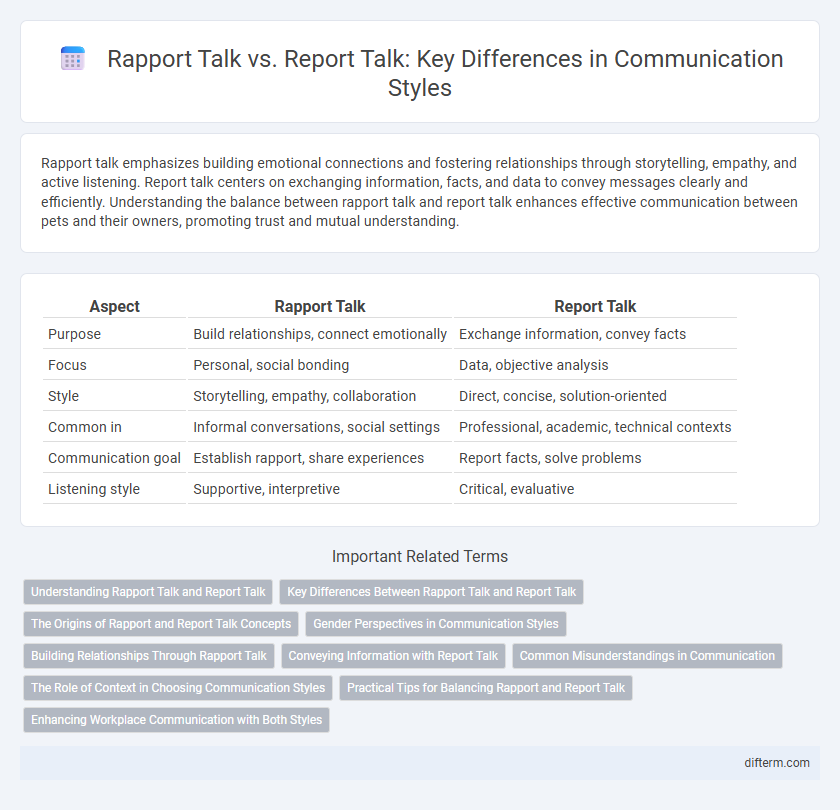Rapport talk emphasizes building emotional connections and fostering relationships through storytelling, empathy, and active listening. Report talk centers on exchanging information, facts, and data to convey messages clearly and efficiently. Understanding the balance between rapport talk and report talk enhances effective communication between pets and their owners, promoting trust and mutual understanding.
Table of Comparison
| Aspect | Rapport Talk | Report Talk |
|---|---|---|
| Purpose | Build relationships, connect emotionally | Exchange information, convey facts |
| Focus | Personal, social bonding | Data, objective analysis |
| Style | Storytelling, empathy, collaboration | Direct, concise, solution-oriented |
| Common in | Informal conversations, social settings | Professional, academic, technical contexts |
| Communication goal | Establish rapport, share experiences | Report facts, solve problems |
| Listening style | Supportive, interpretive | Critical, evaluative |
Understanding Rapport Talk and Report Talk
Rapport talk centers on building relationships through empathetic listening, emotional sharing, and fostering connection, predominantly used in social contexts to establish trust and intimacy. Report talk involves exchanging information, emphasizing facts, data, and problem-solving, often employed in professional or formal settings to convey expertise and achieve objectives. Recognizing these communication styles enhances interpersonal effectiveness by aligning conversational approaches with social or task-oriented goals.
Key Differences Between Rapport Talk and Report Talk
Rapport talk emphasizes building emotional connections and fostering relationships through empathy and shared experiences, often used in personal conversations. Report talk centers on exchanging information, facts, and problem-solving, typically found in professional or formal settings. Understanding these distinctions enhances effective communication by tailoring the approach to the social context and audience needs.
The Origins of Rapport and Report Talk Concepts
The concepts of rapport talk and report talk were originally introduced by sociolinguist Deborah Tannen to describe distinct communication styles typically associated with women and men, respectively. Rapport talk emphasizes building connections, fostering empathy, and creating interpersonal relationships, while report talk centers on exchanging information, asserting status, and delivering facts. These communication models originate from gender-based socialization patterns that influence conversational objectives and interaction dynamics.
Gender Perspectives in Communication Styles
Rapport talk, commonly associated with women, emphasizes building connections, empathy, and emotional sharing, fostering relational intimacy through collaborative dialogue. Report talk, often linked to men, prioritizes information exchange, status assertion, and problem-solving, focusing on delivering facts and achieving outcomes efficiently. Understanding these gender-influenced communication styles enhances interpersonal effectiveness and reduces misunderstandings in diverse social and professional interactions.
Building Relationships Through Rapport Talk
Rapport talk emphasizes emotional connection and empathy, fostering trust and mutual understanding in communication. This style of conversation enhances relationship-building by encouraging active listening and sharing personal experiences. Prioritizing rapport talk strengthens social bonds and creates a supportive environment for open dialogue.
Conveying Information with Report Talk
Report talk emphasizes conveying information clearly and efficiently, often prioritizing facts, data, and logical organization to achieve specific goals. This communication style suits professional settings, such as business meetings and presentations, where clarity and accuracy are critical. Effective report talk strengthens decision-making by providing concise, structured information that supports analysis and problem-solving.
Common Misunderstandings in Communication
Rapport talk emphasizes building connections and emotional bonding, often associated with empathetic listening and storytelling, while report talk focuses on exchanging information and facts, typically seen in problem-solving contexts. Common misunderstandings arise when individuals misinterpret the intent behind these styles, perceiving rapport talk as indirect or report talk as cold and impersonal. Recognizing these differences enhances effective communication by aligning expectations with conversational goals.
The Role of Context in Choosing Communication Styles
Context significantly influences the choice between rapport talk and report talk, as rapport talk emphasizes building emotional connections and fostering empathy in informal or personal settings. Report talk, tailored for professional or task-oriented environments, prioritizes information exchange, clarity, and problem-solving. Understanding situational demands and audience expectations is crucial in selecting the appropriate communication style for effective interaction.
Practical Tips for Balancing Rapport and Report Talk
Effective communication balances rapport talk, which emphasizes empathy and relationship-building, with report talk, centered on information exchange and problem-solving. Practical tips include actively listening to understand emotions during rapport talk while clearly presenting facts in report talk, tailoring your approach based on context and audience. Mastering this balance enhances collaboration, reduces misunderstandings, and fosters stronger professional and personal connections.
Enhancing Workplace Communication with Both Styles
Effective workplace communication thrives by balancing rapport talk and report talk, fostering collaboration and clarity. Rapport talk strengthens interpersonal connections through empathy and active listening, essential for team cohesion and conflict resolution. Report talk delivers clear, concise information and data, enabling efficient decision-making and task management.
rapport talk vs report talk Infographic

 difterm.com
difterm.com